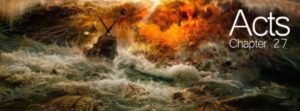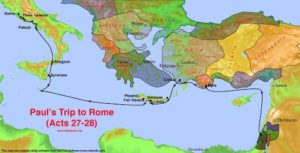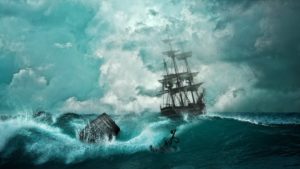TODAY’S READING FROM THE OLD TESTAMENT- 1 CHRONICLES 7:1-8:40
What we notice in the genealogies is that this chronicler is listing the tribal descendants that focus on the purpose of God in the Davidic covenant.
The writer recognizes that King David must be a foreshadowing of a Greater King that is to come in order to fulfill God’s promise.
The Apostle Paul explains the purpose of God in the Davidic covenant when he preaches in Acts 13.
Acts 13:22-23 22 “… He raised up David to be their king, concerning whom He also testified and said, ‘I HAVE FOUND DAVID the son of Jesse, A MAN AFTER MY HEART, who will do all My will.’ 23 “From the descendants of this man, according to promise, God has brought to Israel a Savior, Jesus.”
During the time of David, the tribes of Issachar, Benjamin, and Asher, were of assistance, ready to serve in the interests of the King, and therefore a fuller treatment is given to them in the genealogies.
Both genealogies and the number of fighting men are given in respect to those three tribes.
The sons of Issachar were listed as fighting men, ready for battle. Later in the Book we will see that they are recognized for their understanding the times!
1 Chronicles 12:32 32 Of the sons of Issachar, men who understood the times, with knowledge of what Israel should do, their chiefs were two hundred; and all their kinsmen were at their command.
David served the purposes of God in his generation (Acts 13:36), as did the sons of Issachar. Can it be said of us also?
The sons of Benjamin are noted for their readiness to serve their king in times of war. The sons of Asher are noted as “choice men, brave warriors, and outstanding leaders.”
In contrast, only one sentence is given to the tribe of Naphtali.
We have the record of Shaharaim practicing polygamy, divorcing two of his wives before marrying Hodesh (8:8-9). God hates divorce and that He does not condone polygamy. The Bible records the egregious sins of humankind, with stark realism. Because He records them does not mean He condones them. Against the background of human depravity, we have a portrait of divine mercy.
The genealogy of King Saul begins in 1 Chronicles 8:1, starting with Saul’s ancestor, Benjamin. Saul’s birth is recorded in 1 Chronicles 8:33. This genealogy is repeated in Chapter 9:35-44 because the Chronicler is going to start the narrative with an account of Saul’s reign in Chapter 10. His dynasty ends with his death, but the family line continues for many generations, some of whom are recorded here. One of the many sons and grandsons of Saul who is not listed in Chronicles is Mordecai, who will feature in the history of God’s people during their time of subjection to the Persians in the Book of Esther
Esther 2:5-6 5 Now there was at the citadel in Susa a Jew whose name was Mordecai, the son of Jair, the son of Shimei, the son of Kish, a Benjamite, 6 who had been taken into exile from Jerusalem with the captives who had been exiled with Jeconiah king of Judah, whom Nebuchadnezzar the king of Babylon had exiled.
TODAY’S READING FROM THE NEW TESTAMENT – ACTS 27:1-20
In Chapter 27 we have the best account from the ancient world of a sea voyage. The Apostle Paul is being taken from Caesarea to be tried before Caesar in Rome. The description of the sea voyage and shipwreck is one of the best told stories of ancient history. It is the product of an eye-witness. Luke who writes it was there.
Luke takes great interest in recording the details. He was accurate in terms of regard to the route taken, ancient navigating skills, even the details of the ship’s physical construction and the way in which the sailors tried to cope with the storm.
Luke furnishes so much accurate detail that mariners have been able to calculate the speed and direction of the ships drift during the storm.
The calculations considering the distance between the island of Cauda and the eastern tip of Malta is 476.6 miles. They can calculate based on the ship size, and the mean intensity of the gale. The calculations work out precisely as Luke records. A drift of 14 days to Malta. They can theoretically work out the route and landing place.
Paul, technically a prisoner of Rome, is under the custody of a Roman centurion named Julius who would be punished by death if any of his prisoners escaped. Yet this cohort affords Paul the privilege of having Luke and Aristarchus accompany him.
This event takes place in October of 59 AD. Sailing the Mediterranean would get hazardous in September, and nearly impossible in November due to stormy weather and cloud cover. Ship captains in these times were without compasses and navigated by the stars, so they were dependent on favorable weather. Because of financial prospects and the fact that the captain did not want to spend the winter in Lasea, Paul’s warning to wait was rejected.
Paul gave a warning in Acts 27:10
Acts 27:10 10 and said to them, “Men, I perceive that the voyage will certainly be with damage and great loss, not only of the cargo and the ship, but also of our lives.”
The centurion chose to heed the urgings of the pilot and captain of the ship to set sail rather than listen to Paul’s advice. Soon the ship was caught in a Northeaster, a fierce storm called Euraquilo.
This chapter inspires us to trust the Lord when we go through storms.
We see how God by sovereign decree uses secondary means to bring about His saving purposes.
Paul speaks of what he knows to be God’s will of decree. “There will be no loss of life” 26:22). Yet he also warns that “unless everyone stays on board and does their part, those who go overboard will die” (26:31). Notice these two statements from Paul that appear to be contradictory:
Acts 27:22 22 “Yet now I urge you to keep up your courage, for there will be no loss of life among you, but only of the ship.
Acts 27:31 31 Paul said to the centurion and to the soldiers, “Unless these men remain in the ship, you yourselves cannot be saved.”
Both statements are true. Paul had special knowledge of God’s will of decree. God has decreed both statements. God ordains the means as well as the end.
God uses the crew to run the ship into the shore of Malta. God could have delivered Paul and the crew supernaturally by rebuking the wind and the waves. But God sovereignly decrees how He will accomplish His purposes. He works with the instrumentality of storms, winds, AND human beings.
The same God who determined the ends, also determined the means.
The physical salvation of the crew depended on the actions of the centurion and the crew whom God ordained to be the means of His working out His saving purposes.
Our duty as ambassadors of Christ is to proclaim the good news. We are to make known the person and work of Christ and the promise of forgiveness. We are to urge men to repent and be reconciled to God through trusting Christ as their Lord and Savior. These are the very means that God will use to save those whom He effectually draws to Christ. He does not save sinners apart from the means He has chosen.
Romans 10:13-15 13 for “WHOEVER WILL CALL ON THE NAME OF THE LORD WILL BE SAVED.” 14 How then will they call on Him in whom they have not believed? How will they believe in Him whom they have not heard? And how will they hear without a preacher? 15 How will they preach unless they are sent? Just as it is written, “HOW BEAUTIFUL ARE THE FEET OF THOSE WHO BRING GOOD NEWS OF GOOD THINGS!”
TODAY’S READING FROM THE BOOK OF PSALMS- PSALM 7:1-17
Here is another prayer from the Psalmist who is threatened with troubles. He asks the Lord to examine his heart, to assure that he is in a right relationship with the Deliverer in Whom he trusts!
We see humility and boldness in this psalm. Humble confession and self-examination in verses 3-5; Bold requests in verses 6-9. Bold confession of the truth in verses 10-16; Humble worship and bold praise in verse 17.
TODAY’S READING FROM THE BOOK OF PROVERBS- PROVERBS 18:22
Proverbs 18:22 22 He who finds a wife finds a good thing and obtains favor from the LORD.
PRAY FOR THE NATIONS
INDONESIA- The unique culture and beauty of Bali attracts millions of tourists. Most bring a godless, self-seeking way of life. A few bring the gospel. Bali has 49,000 Hindu temples, as most Balinese practice a version of Hinduism. Occult, magic, and spiritism all influence the people. Balinese Christians are few. Converts to Christ often face persecution when they change their way of life. Bali needs the power of the gospel to set its people free. 1 million Balinese live on Sumatra, Sulawesi, and Lombok, and have more openness to the gospel in those places.
PRAYER: Heavenly Father, we want to serve Your purposes in our generation. Thank You for faithfully and mercifully calling us into the fellowship of Your Son who has provided the peace of our reconciliation with You. We praise You for Your presence in the storms of life and how You use them to shape us, mold us, instruct us and conform us to the image of Christ. You deal with Your people in righteousness. We offer You our praise in Jesus Name. Amen.
